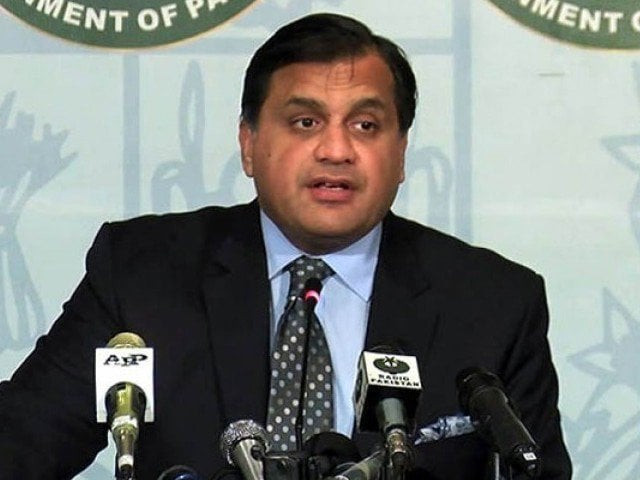Pakistan ‘officially’ offers India consular access to Jadhav
FO spokesperson says reply from Indian side awaited

Foreign Office Spokesperson Dr Mohammad Faisal. PHOTO: FILE
"We have offered the Indian High Commission to avail consular access on Friday [today]. The reply from the Indian side is awaited," Foreign Office spokesperson Dr Muhammad Faisal told a weekly news briefing here on Thursday.
Sources revealed to The Express Tribune that India had accepted Pakistan’s offer and nominated a senior official to hold a meeting with Jadhav. However, there was no official confirmation about this development.
It was also learnt that the Indian High Commission was in contact with a lawyer to plead Jadhav’s case. It was also not yet clear whether the convict would approach the high court against the military court’s judgement of awarding him death sentence.
Pakistan vindicated at ICJ
Earlier, renowned lawyer Salman Akram Raja said, “Any local lawyer can represent Jadhav. Under Article 199 (3), he can approach a high court to get remedy.”
Another lawyer said, “The government of Pakistan on behalf of him [Jadhav] can file a petition in the high court.”
The International Court of Justice (ICJ) in its verdict disappointed India as it neither annulled Jadhav’s conviction nor referred his matter for retrial.
The ICJ directed Pakistan to take all measures to provide for effective review and reconsideration, including, if necessary, by enacting “appropriate legislation”.
The court believed that the obligation to provide effective review and reconsideration could be carried out in various ways and the choice of means was left to Pakistan.
The court asked Pakistan for “effective review and reconsideration of the conviction and sentence of Mr Jadhav” so as to ensure that full weight was given to the effect of the violation of the rights set forth in Article 36, Paragraph 1, of the Vienna Convention and guarantee that the violation and the possible prejudice caused by the violation were fully examined.
Kulbhushan Jadhav case verdict on July 17
The ICJ also maintained stay on the execution of Jadhav till “effective review”.
The court pointed out that respect for the principles of a fair trial was of cardinal importance in any review and reconsideration, and that, in the circumstances of the present case, it was essential for the review and reconsideration of the conviction and sentence of Jadhav to be effective.
The ICJ considered that violation of the rights set forth in Article 36, Paragraph 1, of the Vienna Convention, and its implications for the principles of a fair trial, should be fully examined and properly addressed during the review and reconsideration process.
In particular, any potential prejudice and the implications for the evidence and the right of defence of the accused should receive close scrutiny during the review and reconsideration, it added.
ICJ’s background of Jadhav case
The judgement notes that in the present case, the death sentence imposed on Jadhav by the Field General Court Martial of Pakistan was confirmed by the chief of army staff on April 10, 2017.
The evidence suggested that Jadhav appealed to the Military Appellate Court under Section 133 (B) of the Pakistan Army Act of 1952, but that the appeal was rejected.
“With regard to the petition procedure, the evidence suggests that Mr Jadhav has made a mercy petition to the chief of army staff, and that the mother of Mr Jadhav has sought to file a petition with the federal government of Pakistan under Section 131 and an appeal under Section 133 (B) of the Act. There is no evidence before the court to indicate the outcome of those petitions or that appeal,” it added.
ICJ discusses Pakistan judicial system
The ICJ noted that according to Pakistan, the high courts of Pakistan could exercise review jurisdiction. The court observed; however, that Article 199, Paragraph 3, of the Constitution of Pakistan had been interpreted by the Supreme Court as limiting the availability of such review for a person who was subject to any law relating to the armed forces of Pakistan, including the Pakistan Army Act of 1952.
The judgement stated that the Supreme Court stated that the high courts and the Supreme Court might exercise judicial review over a decision of the Field General Court Martial on “the grounds of coram non judice, without jurisdiction or suffering from mala fides, including malice in law only”.
Article 8, Paragraph 1, of the Constitution provides that any law which was inconsistent with fundamental rights guaranteed under the Constitution was void, but this provision does not apply to the Pakistan Army Act of 1952 by virtue of a constitutional amendment, it added.
However, the ICJ noted that it was not clear whether judicial review of a decision of a military court was available on the ground that there had been a violation of the rights set forth in Article 36, Paragraph 1, of the Vienna Convention.
The ICJ referred to the Peshawar High Court’s last year verdict, wherein it was held that the high court had the legal mandate positively to interfere with decisions of military courts “if the case of the prosecution was based, firstly, on no evidence; secondly, insufficient evidence; thirdly, absence of jurisdiction, and finally malice of facts and law”.
The government of Pakistan appealed that the decision and the case was still pending at the close of the oral proceedings in the present case.
The court also took full cognisance of Pakistan’s counsel oral arguments that the Constitution of Pakistan guaranteed, as a fundamental right, the right to a fair trial; that the right to a fair trial was “absolute” and “cannot be taken away”; and that all trials were conducted accordingly and, if not, “the process of judicial review is always available”.
The counsel for Pakistan assured the court that the high courts of Pakistan exercise “effective review jurisdiction”, giving as an example the decision of the Peshawar High Court.



















COMMENTS
Comments are moderated and generally will be posted if they are on-topic and not abusive.
For more information, please see our Comments FAQ